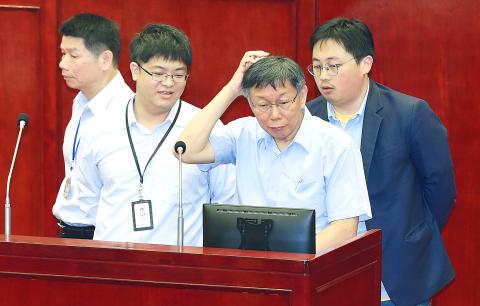The Human Rights Network for Tibet and Taiwan yesterday demanded an apology from Taipei Mayor Ko Wen-je (柯文哲) for saying that Tibetan lamas were causing trouble for the Chinese government by self-immolating.
Ko on Wednesday said at a Taipei City Government briefing on public safety that self-immolation was a “trendy” thing to do among Tibetan lamas, adding that the behavior “caused great trouble for the Chinese government.”
Self-immolation is a public safety hazard and “not a very good way to commit suicide,” he said.

Photo: Liao Chen-huei, Taipei Times
“Why would anyone choose self-immolation to take their own life? That is weird. Why self-immolation? I do not get it,” he said, laughing.
Group president Tashi Tsering yesterday said that he found Ko’s remarks to be “infuriating” and impossible to understand.
Despite being an influential political figure, Ko appears to be oblivious to the suffering of people in Tibet, Xinjiang and Hong Kong under the authoritarian rule of the Chinese Communist Party, and uninterested in learning about the truth, he said.
“He is only willing to speak for the Chinese government and only worried that people’s protests would lead to inconvenience for the government,” Tashi said, adding that the mayor should apologize for his remarks.
Tibetans have not chosen self-immolation to be trendy, but rather to stand up for people who are suffering, the group said, adding that many of them left behind a letter stating their beliefs and calling for freedom.
Ko’s remarks appeared to blame Tibetans for causing trouble while ignoring the Chinese government’s crackdowns on Tibetan religion, culture and human rights, said independent Legislator Freddy Lim (林昶佐), who is head of the Taiwan Parliamentary Group for Tibet.
Self-immolation has been the most poignant form of protest by Tibetans to safeguard their faith and dignity against the Chinese government’s relentless suppression, he said, adding that at least 159 Tibetans have self-immolated since 2002.
“Who chooses self-immolation just because it is a trendy thing to do?” Lim asked, adding that politicians should be more sympathetic.
During a question-and-answer session at the Taipei City Council yesterday, New Power Party Taipei City Councilor Lin Ying-meng (林穎孟) asked the mayor to take back his controversial remarks, which she said went against the city’s values of freedom, democracy and human rights.
Ko said that words spoken cannot be retracted, adding: “I am still not a fan of radical protests.”

Tropical Storm Gaemi strengthened into a typhoon at 2pm yesterday, and could make landfall in Yilan County tomorrow, the Central Weather Administration (CWA) said yesterday. The agency was scheduled to issue a sea warning at 11:30pm yesterday, and could issue a land warning later today. Gaemi was moving north-northwest at 4kph, carrying maximum sustained winds near its center of up to 118.8kph and gusts of 154.8kph. The circumference is forecast to reach eastern Taiwan tomorrow morning, with the center making landfall in Yilan County later that night before departing from the north coast, CWA weather forecaster Kuan Shin-ping (官欣平) said yesterday. Uncertainty remains and

SEA WARNING LIKELY: The storm, named Gaemi, could become a moderate typhoon on Wednesday or Thursday, with the Taipei City Government preparing for flooding A tropical depression east of the Philippines developed into a tropical storm named Gaemi at 2pm yesterday, and was moving toward eastern Taiwan, the Central Weather Administration (CWA) said. Gaemi could begin to affect Taiwan proper on Tuesday, lasting until Friday, and could develop into a moderate typhoon on Wednesday or Thursday, it said. A sea warning for Gaemi could be issued as early as Tuesday morning, it added. Gaemi, the third tropical storm in the Pacific Ocean this typhoon season, is projected to begin moving northwest today, and be closest to Taiwan on Wednesday or Thursday, the agency said. Today, there would likely

DISRUPTIONS: The high-speed rail is to operate as normal, while several airlines either canceled flights or announced early departures or late arrivals Schools and offices in 15 cities and counties are to be closed today due to Typhoon Gaemi, local governments announced last night. The 15 are: Taipei, New Taipei City, Taoyuan, Tainan, Keelung, Hsinchu and Kaohsiung, as well as Yilan, Hualien, Hsinchu, Miaoli, Chiayi, Pingtung, Penghu and Lienchiang counties. People should brace for torrential rainfall brought by the storm, with its center forecast to make landfall on the east coast between tonight and tomorrow morning, the Central Weather Administration (CWA) said. The agency issued a sea warning for the typhoon at 11:30pm on Monday, followed by a land warning at 11:30am yesterday. As of

CASUALTY: A 70-year-old woman was killed by a falling tree in Kaohsiung as the premier warned all government agencies to remain on high alert for the next 24 hours Schools and offices nationwide are to be closed for a second day today as Typhoon Gaemi crosses over the nation, bringing torrential rain and whipping winds. Gaemi was forecast to make landfall late last night. From Tuesday night, its outer band brought substantial rainfall and strong winds to the nation. As of 6:15pm last night, the typhoon’s center was 20km southeast of Hualien County, Central Weather Administration (CWA) data showed. It was moving at 19kph and had a radius of 250km. As of 3pm yesterday, one woman had died, while 58 people were injured, the Central Emergency Operation Center said. The 70-year-old